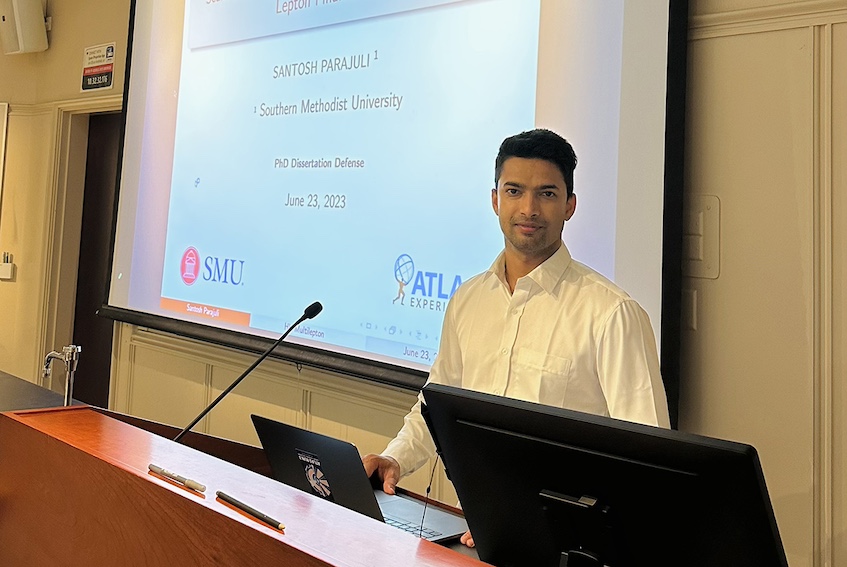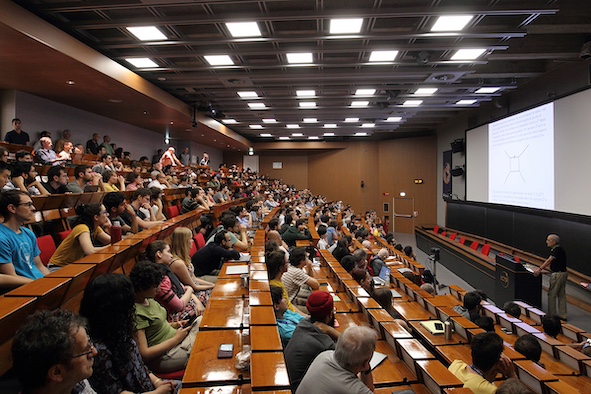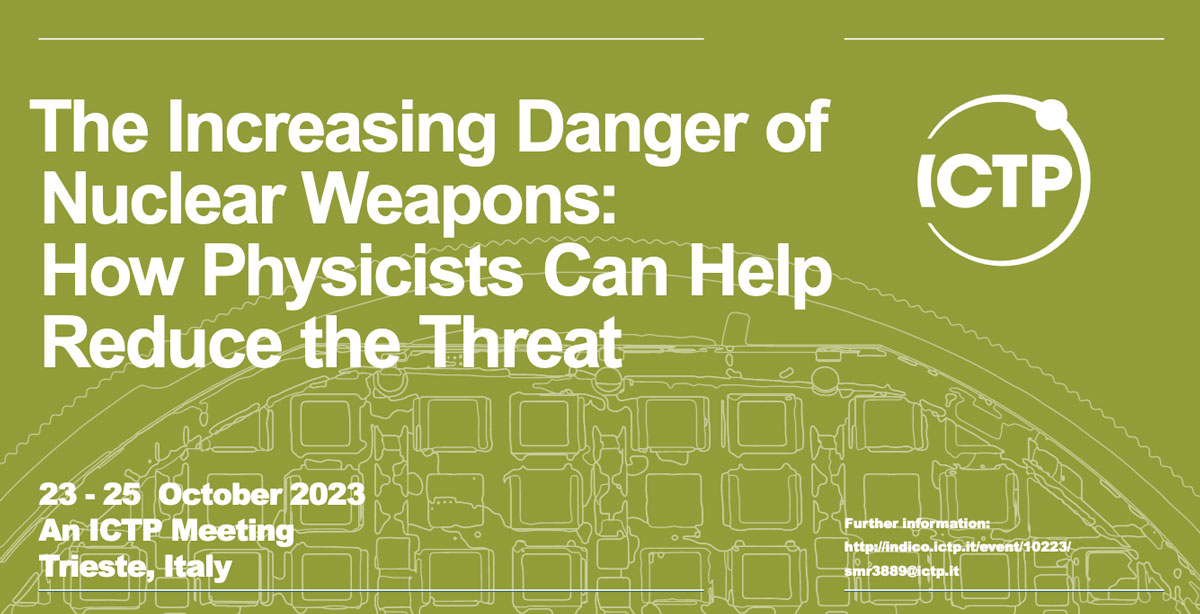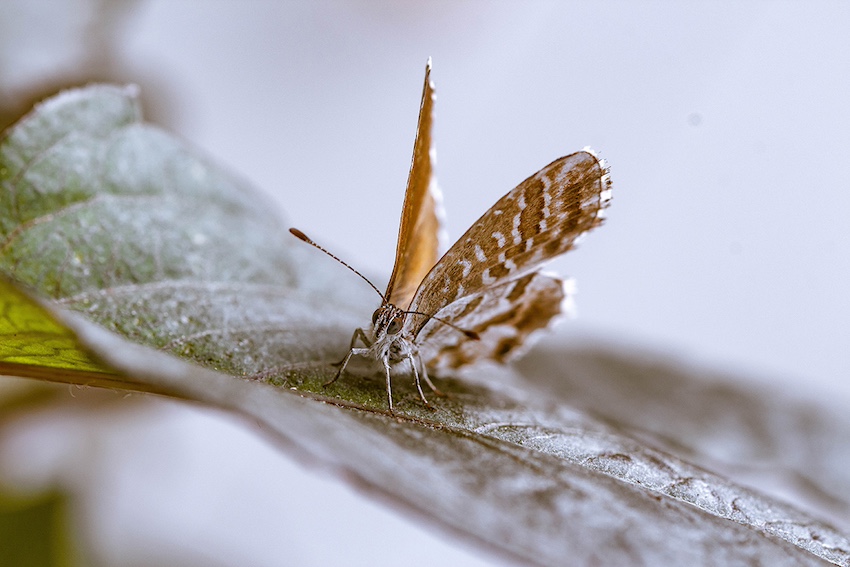| Back to the archive | |

| |
October 2023 | |
|
News | |
 Physics Without Frontiers Success Story: Santosh Parajuli's Journey in Particle PhysicsSantosh Parajuli of Nepal is one of the thousands of students impacted by ICTP’s Physics Without Frontiers (PWF) initiative, a global endeavor dedicated to inspiring, educating, and empowering university students in physics and mathematics, particularly in regions where the development of science and technology may still be in its early stages. In an interview with ICTP, Santosh talks about his academic journey and the important role that PWF played in getting him to where he is today. Read more ... | |
 ICTP’s Announces its 2024 Scientific CalendarEach year, ICTP offers a wealth of opportunities and activities for researchers and students from around the world. Looking ahead to 2024, a particularly significant year for the centre as it celebrates its 60th anniversary, ICTP has announced its Scientific Calendar of conferences, workshops, and schools for the coming year. Within each of the Centre's research sections, a multitude of events have been organized, aimed to attract the foremost experts in their respective fields. Read more ... | |
 ICTP Workshop Explores How to Re-engage Physicists in Reducing Weapons ThreatInterest in nuclear policy has waned in the physics community after the end of the Cold War, as the issue slowly disappeared from the public consciousness. Fast-forward to 2023 and a climate in which more nations than ever are developing a nuclear arsenal, and a key question presents itself: can physicists return to the discussion of nuclear policy, and if so, how? A recent ICTP workshop on 'The Increasing Danger of Nuclear Weapons: How Physicists Can Help Reduce the Threat' addressed this question, provided scientists with an opportunity to understand and discuss nuclear policy from all aspects. Read more ... | |
 From Moths to Olfactory Search Models: Recent QLS Paper Highlights New Sensing ApproachOrganisms of all sizes use odor to send information across long distances. Determining the origin of odor is often essential to survival, and organisms such as moths are able to determine the starting point of a sparse odor signal dispersed in the air. However, the sparsity of odors and complex encoding of origin information make it difficult to develop simple search algorithms that exploit this natural phenomenon. Researchers in ICTP's Quantitative Life Sciences section have developed a computational olfactory search model using algorithmic devices with a small set of discrete memory states; a paper about the model has appeared in the Proceedings of the National Academy of Sciences (PNAS). Read more ... | |
 ICTP-Brazil ConnectionICTP and the São Paulo State University (UNESP) have renewed their support for ICTP's partner institute in Brazil, the ICTP-South American Institute for Fundamental Research (ICTP-SAIFR). Created in 2010 and housed at the Instituto de Física Teórica of UNESP's Barra Funda campus, ICTP-SAIFR fosters the advancement of basic sciences in South American countries. The new agreement recognises the success of the institute's theoretical physics research and training, which has helped ICTP-SAIFR become a centre of excellence in South America. Read more ... | |
 The Complex World of Inequality: Matteo Marsili Discusses Quantitative Research into Inequality in Complex SystemsInequality is a key factor in any analysis of sustainability, although the way in which it is addressed varies widely depending on the approach and objectives of researchers. Complex systems scientists can use methods from statistical mechanics to study the interdisciplinary aspects of sustainability and inequality from a quantitative perspective. Matteo Marsili, senior research scientist with ICTP's Quantitative Life Sciences section, talks about ICTP’s efforts in this direction. Read more ... | |
|
Opportunities | |
Call for Applications: HECAP Short-term VisitsThe ICTP High Energy, Cosmology and Astroparticle Physics (HECAP) section offers a number of grants for short-term visits. The purpose of the visits is to perform theoretical studies in HECAP's areas of expertise and in close interaction with the section's resident staff and visiting scientists. Short-term visits may be for a maximum period of 3 months. Scientists from developing countries are encouraged to apply. Application deadline: 10 November 2023. Read more ... | Call for Applications: “Ludwig Boltzmann” Senior Postdoctoral FellowshipICTP's Condensed Matter and Statistical Physics (CMSP) section seeks applicants for its “Ludwig Boltzmann” Senior Postdoctoral Fellowship starting Fall 2024 from outstanding young scientists of any nationality with a strong research record; women are particularly encouraged to apply. Candidates should have at least one previous postdoctoral experience, and very active and independent research in their own area. Application deadline: 15 November 2023. Read more ... |
Postdoctoral Position in ICTP's HECAP SectionSeveral postdoctoral positions will be available in ICTP's HECAP section with an expected starting date in October 2024. Appointments will be for 2+1 years. Postdocs working on cosmology and astroparticle physics will also participate in the initiatives of the Institute for the Fundamental Physics of the Universe, a collaboration between ICTP, the International School for Advanced Studies (SISSA), the Trieste Observatory and INFN. Application deadline: 30 November 2023. Read more ... | Call for Nominations, ICTP-IMU Ramanujan PrizeICTP and the International Mathematical Union (IMU) are looking for outstanding, young mathematicians from developing countries to be nominated for the 2024 ICTP-IMU Ramanujan Prize. The Ramanujan Prize for young mathematicians from developing countries has been awarded annually since 2005 and is administered jointly by the ICTP and IMU. It is usually awarded to one person, but may be shared equally among recipients who have contributed to the same body of work. Nomination deadline: 1 February 2024. Read more ... |
ICTP's Training and Research in Italian Laboratories (TRIL) ProgrammeAre you a scientist from a developing country looking for laboratory training and research opportunities unavailable in your home country? ICTP's TRIL programme can help! Through TRIL, you can spend time in one of the hundreds of Italian laboratories that ICTP has agreements with for research in different branches of the physical sciences, boosting your research career through collaboration with world-class scientists and the latest equipment, and learning about Italian culture as well. Application deadline: ongoing. Read more ... | |
|
Upcoming Deadlines | |
Workshop on Twistronics and Moiré Materials: Bridging Theory and Experiments (smr 3918)Deadline: 16 November 2023 | |
|
Important links | |
|
ICTP Scientific Calendar:
https://www.ictp.it/home/scientific-calendar Marie Curie Library: https://library.ictp.it/ A Video Introduction to ICTP: https://www.youtube.com/watch?v=_9dPsxEE6Pk | |





| |
|
Abdus Salam International Centre for Theoretical Physics Strada Costiera 11 34151 Trieste, Italy sci_info@ictp.it Copyright© 2023 All Rights Reserved You received this email because you are registered to receive news from ICTP. Click here to unsubscribe. |
|